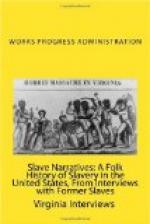“After de wah, everybody jist went on working same as ever. Then one day a white mans come riding through the county and tole us we was free. Free! Honey, did yo’ hear that? Why we always had been free. He didn’t know what he was talking ’bout. He kept telling us we was free and dat we oughtn’t to work for no white folks ’less’n we got paid for it. Well Miss Nancy took care of us then. We got our cabin and a piece of ground for a garden and a share of de crops. Daddy worked in de mill. Miss Nancy saw to it that we always had nice clothes too.
“Ku Klux, honey? Why, we nevah did hear tell of no sich thing where we was. Nevah heered nothin’ ’bout dat atall until we come up here, and dey had em here. Law, honey, folks don’t know when dey’s well off. My daddy worked in de mill and save his money, and twelve yeahs aftah de wah he bought two hundred and twenty acres of land, ’bout ten miles away. Den latah on daddy bought de mill from de Mosleys too. Yas’m, my daddy was well off.
“My, you had to be somebody to votes. I sure do ’membahs all ’bout dat. You had to be edicated and have money to votes. But I don’ ’membahs no trouble ‘bout de votin’. Not where we come from, no how.
“I was married down dere. Mah husband’s fust name was Monroe after the county we lived in. My chilluns was named aftah some of the Mosleys. I got a Ed and Hattie. Aftah my daddy died we each got forty acahs. I sold mine and come up here to live with my boys.
“But honey dis ain’t no way to raise chilluns. Not lak dey raised now. All dis dishonesty and stealin’ and laziness. No mam! Look here at my gran’sons. Eatin’ offen dey daddy. No place for ’em. Got edication, and caint git no jobs outside cuttin’ grass and de like. Down on de plantation ev’body worked. No laziness er ’oneriness, er nothin! I tells yo’ honey, I sure do wish these chilluns had de chances we had. Not much learnin’, but we had up-bringin’! Look at dem chilluns across de street. Jist had a big fight ovah dere, and dey mothah’s too lazy to do any thing ‘bout it. No’m, nevah did see none o’ dat when we was young. Gittin’ in de folkeses hen houses and stealing, and de carryins on at night. No mam! I sure do wish de old times was here.
“I went back two-three yeahs ago, to de old home place, and dere it was, jist same as when I was livin’ with Miss Nancy. Co’se, theys all dead and gone now, but some of the gran’chilluns was around. Yas’m, I membahs heap bout dem times.”
Miriam Logan, Reporter Lebanon, Ohio
Warren County, District 21
Story of WADE GLENN from Winston-Salem North Carolina: (doesn’t know his age)
“Yes Madam, I were a slave—I’m old enough to have been born into slavery, but I was only a baby slave, for I do not remember about slavery, I’ve just heard them tell about it. My Mammy were Lydia Glenn, and father were Caesar Glenn, for they belonged to old Glenn. I’ve heard tell he were a mean man too. My birthday is October 30th—but what year—I don’t know. There were eight brothers and two sisters. We lived on John Beck’s farm—a big farm, and the first work for me to do was picking up chips o’ wood, and lookin’ after hogs.




